
South Ossetia, officially the Republic of South Ossetia – the State of Alania, is a partially recognised landlocked state in the South Caucasus. It has an officially stated population of just over 56,500 people (2022), who live in an area of 3,900 square kilometres (1,500 sq mi), on the south side of the Greater Caucasus mountain range, with 33,000 living in the capital city, Tskhinvali. Only Russia, Venezuela, Nicaragua, Nauru, and Syria recognise South Ossetia as a sovereign state. Although Georgia does not control South Ossetia, the Georgian government and the United Nations consider the territory part of Georgia.

Tskhinvali or Tskhinval is the capital of the disputed de facto independent Republic of South Ossetia, internationally considered part of Shida Kartli, Georgia, and previously the capital of the erstwhile Soviet Georgian South Ossetian Autonomous Oblast. It is located on the Great Liakhvi River approximately 100 kilometres (62 mi) northwest of the Georgian capital Tbilisi.

The Georgian–Ossetian conflict is an ethno-political conflict over Georgia's former autonomous region of South Ossetia, which evolved in 1989 and developed into a war. Despite a declared ceasefire and numerous peace efforts, the conflict remained unresolved. In August 2008, military tensions and clashes between Georgia and South Ossetian separatists erupted into the Russo-Georgian War. Since then, South Ossetia has been under Russian occupation.
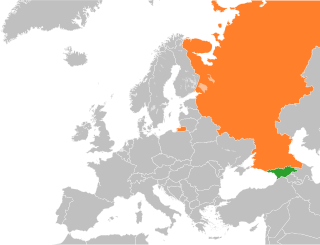
Georgia–Russia relations are the bilateral ties between Georgia and the Russian Federation. The two countries have had no formal diplomatic relations since August 2008, largely due to the Russo-Georgian War and Russian recognition of separatist regions. Instead, the Swiss embassy in Tbilisi hosts a Russian interest section, while the interest section of Georgia is hosted in Moscow.
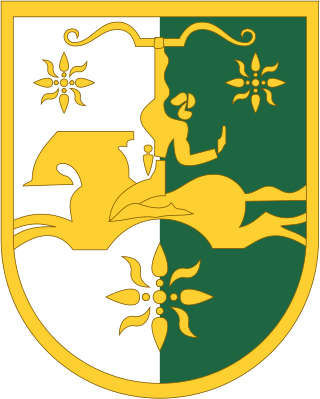
The Republic of Abkhazia is a partially recognized state in the South Caucasus that declared independence from Georgia during the War in Abkhazia (1992–1993). At the time, the Soviet Union had only just recently collapsed. Since 1992, Abkhazia has sought recognition as a sovereign state from the international community. Abkhazia is considered by most of the international community to be a part of Georgia.
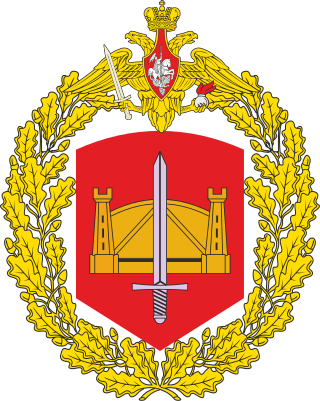
The 58th Combined Arms Army is an army of the Russian Ground Forces, headquartered at Vladikavkaz, North Ossetia-Alania, within Russia's Southern Military District. It was formed in 1941 as part of the Soviet Union's Red Army and has been part of the Russian Army since 1995.
An international diplomatic crisis between Georgia and Russia began in 2008, when Russia announced that it would no longer participate in the Commonwealth of Independent States economic sanctions imposed on Abkhazia in 1996 and established direct relations with the separatist authorities in Abkhazia and South Ossetia. The crisis was linked to the push for Georgia to receive a NATO Membership Action Plan and, indirectly, the unilateral declaration of independence by Kosovo.

The 2008 Russo-Georgian War was a war between Georgia, on one side, and Russia and the Russian-backed self-proclaimed republics of South Ossetia and Abkhazia, on the other. The war took place in August following a period of worsening relations between Russia and Georgia, both formerly constituent republics of the Soviet Union. The fighting took place in the strategically important South Caucasus region. It is regarded as the first European war of the 21st century.

The Battle of Tskhinvali was a battle for the city of Tskhinvali, capital of the breakaway state of South Ossetia. It was the only major battle in the Russo-Georgian War. Georgian ground troops entered the city on early 8 August 2008, after an artillery assault. Georgians took control of most of the city in hours. Russian main forces began entering South Ossetia through the Roki tunnel. After being initially forced to withdraw, the Georgian troops made several attempts to retake the city. Due to the difficult logistics of the terrain, the arrival of Russian reinforcements was slow. After fierce fighting, Georgian troops were finally forced to withdraw from the city on the evening of 10 August. On 11 August, all Georgian troops left South Ossetia. Parts of Tskhinvali were devastated in the three-day fighting.

The Battle of the Kodori Valley was a military operation during the Russo-Georgian War in the Upper Kodori Valley of Abkhazia, a breakaway region of Georgia. It was the only part of Abkhazia under Georgian control before this military conflict. On 9 August 2008, the Abkhaz military, with support by Russian forces, launched an operation to remove the remaining Georgian troops from the disputed gorge. After three days, the Georgian military left the Upper Kodori Valley.

The Russo-Georgian War broke out in August 2008 and involved Georgia, Russian Federation, South Ossetia and Abkhazia.
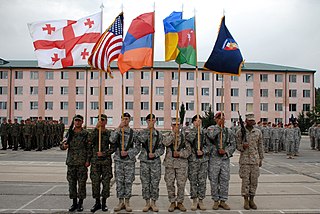
According to United States European Command,
Immediate Response is an annual, bilateral security cooperation exercise conducted between U.S. and NATO and coalition partners. It is a longstanding Joint Chiefs of Staff-directed exercise focused on interoperability training and theater security cooperation, and is designed to promote understanding and cooperation between military forces of the United States and our allies.

This article describes the background of the Russo-Georgian War.

Abkhazia and South Ossetia are disputed territories in the Caucasus. Most countries recognise them as part of Georgia, while Russia, Venezuela, Nicaragua, Nauru, and Syria regard them as independent. Russia's initial recognition of the independence of Abkhazia and South Ossetia occurred in the aftermath of the Russo-Georgian War in 2008. The government of Georgia considers the republics to be Russian-occupied territories.
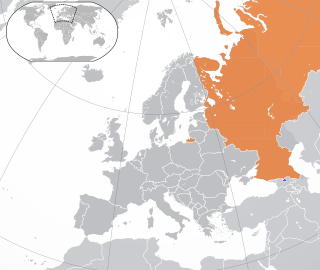
Russia–South Ossetia relations refers to the bilateral relationship between Russia and the Republic of South Ossetia, a disputed region in the South Caucasus, located on the territory of the South Ossetian Autonomous Oblast within the former Georgian Soviet Socialist Republic.

The Russo-Georgian War caused major infrastructural and economic damage throughout Georgian and South Ossetian territory. Many countries promised reconstruction aid to the affected regions.

Both sides of the 2008 war between Russia and Georgia blamed each other for starting the war.
Caucasus 2009 was an operational-strategic military exercise of the Russian armed forces which took place from 29 June to 6 July 2009. It was conducted in 10 southern subjects of the Russian Federation.

Russian-occupied territories in Georgia are areas of Georgia that have been occupied by Russia after the Russo-Georgian War in 2008. They consist of the regions of Autonomous Republic of Abkhazia and the former South Ossetian Autonomous Region of Soviet Georgia, whose status is a matter of international dispute.

The Independence Day or Republic Day is the main state holiday in the partially recognized Republic of South Ossetia. This date is celebrated on September 20. It commemorates South Ossetia's declaration of independence from the Georgian SSR in 1990, and the country's recognition as a sovereign state by Russia in 2008.














